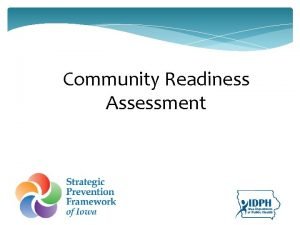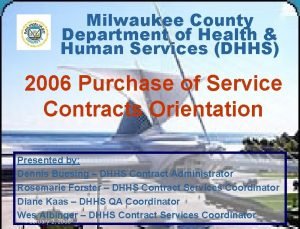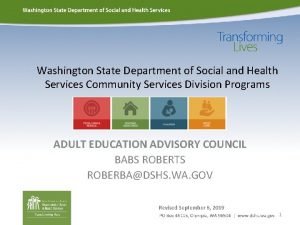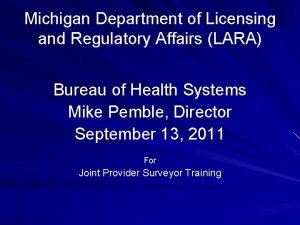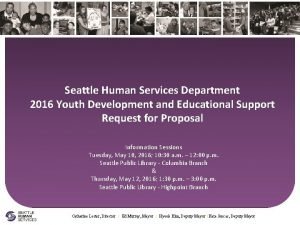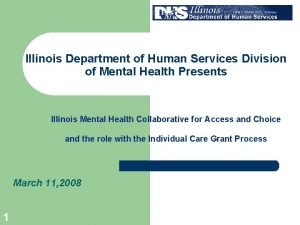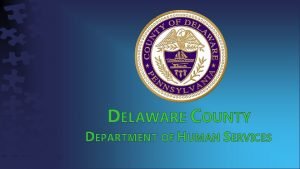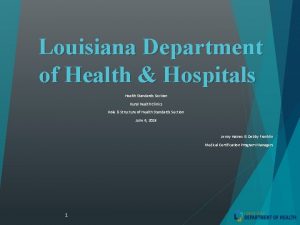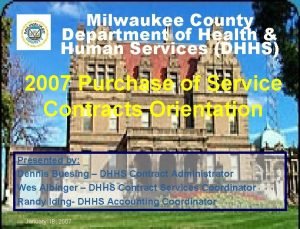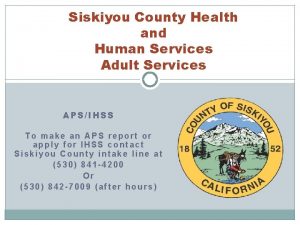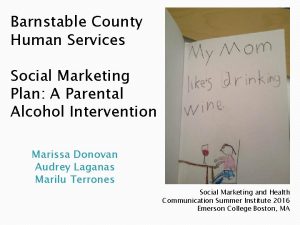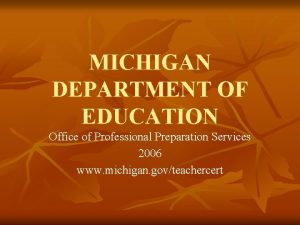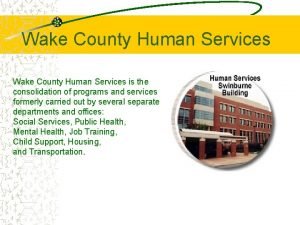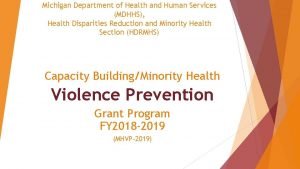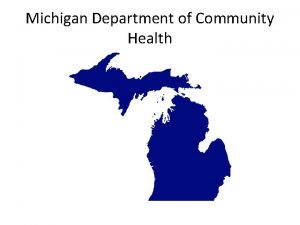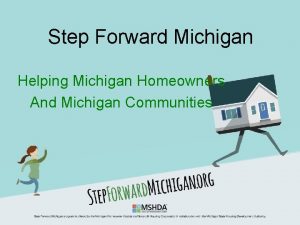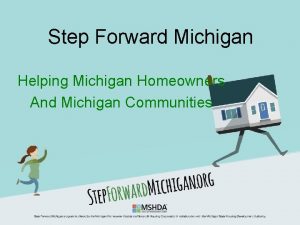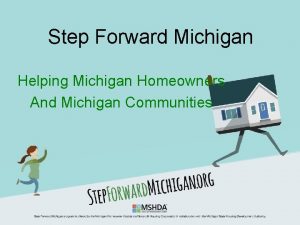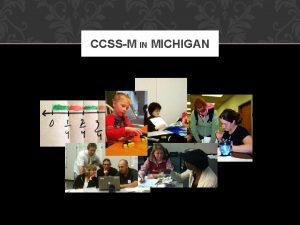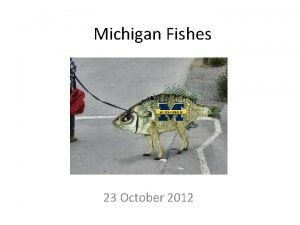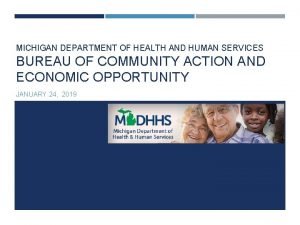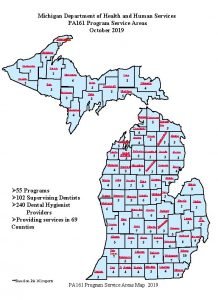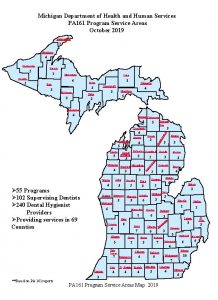Michigan Department of Health and Human Services MDHHS















- Slides: 15

Michigan Department of Health and Human Services (MDHHS), Health Disparities Reduction and Minority Health Section (HDRMHS) Capacity Building/Minority Health Violence Prevention Grant Program FY 2018 -2019 (MHVP-2019)

Minority Health Violence Prevention Program – 2019 (Page 1) q Michigan Department of Health and Human Services (MDHHS) Division of Health, Policy, and Legislative Affairs Health Disparities Reduction and Minority Health Section (HDRMHS) q Issue Date: May 1, 2018 q Up to Four Grant Awards Maximum Award: $37, 500 Total Program Award: $150, 000 No Match Requirement q Implementation Period (Year 1): October 1, 2018 through September 30, 2019

RFP Timeline/Deadline (Page 3 & 6) Pre-application conference (Optional) Deadline for submitting questions regarding the grant application 5/7/2018 (11: 00 a. m. ) 5/11/2018 Q & A Posted on MI E-Grants 5/16/2018 Grant application deadline 6/7/2018 (3: 00 p. m. ) Notification of Award/Denial 7/16/2018 -7/20/2018 Grants awarded modification deadline 8/6/2018

Application Submission (Page 3) http: //egrams-mi. com/dch/ RFP and the Competitive Application Instructions MI E-Grants Applicant Training Manual, which can be found by visiting the MI E-Grants website at http: //egrams-mi. com/dch/ under ‘About EGr. AMS’ One application will be accepted from each applicant. To gain access to the application and complete entry and submission, a step-by-step instruction manual is available for your use. Visit the MI E-Grants website and click the link “About EGr. AMS” on the left-side panel to access the Competitive Application Instructions MI E-Grants Applicant Training Manual. Application and any related materials and attachments must be submitted by the applicant’s Authorized Official electronically using the MI E-Grants website at http: //egramsmi. com/dch. Applicants are encouraged to complete the grant application in advance of the grant application deadline to allow sufficient time to complete the application process and to receive technical assistance if necessary. For technical assistance when entering the application, contact the MI E-Grants Helpdesk at 517 -3359.

Evaluation Method/Scoring Criteria (Pages 4 -5 & 15) Evaluation Method o Objective Review Panel, evaluate and score the applications against the RFP requirements. o The applications are ranked by score. ü Maximum score of (100) based on strength of: Program Narrative (50), Workplan (35), Budget (15) ü (Minimum score of 75 needed for funding consideration) o MDHHS reserves the right to establish the criteria by which it will evaluate each applicant’s response, and by which it will determine the most responsive, capable, and qualified applicants. In addition to cost, other principal factors may be considered in evaluating applications relative to: o Reliability o Applicant’s past performance o Geographic Location/Population Served o Applicant’s ability to respond to all requirements outlined in the RFP o Applicant’s ability to maintain a presence in providing services o Financial stability o Continuity and stability in provision of service o Knowledge transfer activities

Grant Program Specifications (Page 8) No Match Requirement Ø The Request for Proposal (RFP) is open to local health departments, communityand faith-based organizations, tribal health agencies, community health centers, and other entities that can demonstrate experience and relationships in working with one or more of Michigan’s racial and ethnic minority populations: Ø o African American o Hispanic/Latino o Asian American/Pacific Islander o American Indian/Alaska Natives o Arab and Chaldean Americans Funding Purpose: The purpose of the HDRMHS Violence Prevention grant program is to build community capacity to identify and implement population specific strategies to reduce the burden of violence for racial and ethnic minority populations. Prevention activities should address one or more of the risk levels (individual, relationship, community, societal) as cited by the Centers for Disease Control and Prevention, Social Ecological Model: A Framework for Violence Prevention and utilize a targeted universalism approach. .

Centers for Disease Control and Prevention Social Ecological Model: A framework for Violence Prevention https: //www. cdc. gov/violenceprevention/overview/social-ecologicalmodel. html (Pages 8 & 9)

Targeted Universalism (Page 9) Strategies that are designed to support the needs of a particular groups(s) in a way that accounts for differences in access to institutions and resources these groups experience. http: //haasinstitute. berkeley. edu/sites/default/files/20161 025 -kidscount-v 2. pdf

Funding Priorities Are representative of, or have experience working with, racial and ethnic minority populations. Have, or are partnering with, an organization that has prior experience conducting violence prevention outreach and intervention. o Identify Lead/Fiduciary o Four Multi-Sector Partners identified by submission of multi-sector partnership form submitted with application Have the ability to demonstrate successful relationships and/or outreach to the identified target group(s).

Allowable Expenses (Page 10) Funding awarded under this RFP may be used to pay for the following: Ø Direct Costs o Salary and Wages o Fringe Benefits o Travel o Supplies and Materials o Contractual (Subcontracts/Sub-recipients) o Equipment o Other Expenses Indirect Costs o Indirect costs can only be applied if an approved indirect costs rate has been established or an actual rate has been approved by a State of Michigan department or the applicable federal cognizant agency and is accepted by the Department or use a 10% de Minimis rate. Attach a current copy of the letter stating the applicable indirect costs rate.

Grantee Program Requirements (Page 10 -11) Ensure that activities implemented under this grant award are in accordance with established HDRMHS program standards, as well as State and Federal policy and statutes including HIPPA. Participate in technical assistance, training, and/or skills enhancement opportunities as recommended or required by MDHHS/HDRMHS. Adhere to timelines and work plans, budgets, and staffing plans submitted and approved by MDHHS/HDRMHS. Deviations from approved timelines, work plans, budgets and staffing plans must receive advance authorization from MDHHS/HDRMHS. Failure to make reasonable progress in program development may result in revocation or reduction of the grant award. Collaborate with evaluation team consisting of HDRMHS staff and Public Research and Evaluation Services (PRES), the identified cross-site evaluator. Adhere to MDHHS policies and standards related to Institutional Review Board. The grantee has two options for obtaining IRB approval: o (1) The grantee may utilize their own internal IRB process. In this case they would need to submit the approval letter obtained from their IRB and all supporting documents that were submitted for approval with their internal application (e. g. , study plan, surveys). This process may qualify for expedited approval of MDHHS IRB. o (2) The grantee may utilize the MDHHS IRB process by submitting the full MDHHS IRB application with all supporting documentation as referenced above for MDHHS approval. f. Ensure that services and materials are culturally and linguistically appropriate to meet the needs of the respective client populations.

Expected Performance Outcomes (Year 1) (Page 12) During the Agreement, the Grantee shall demonstrate measurable progress toward the achievement of the outcomes listed below: (Year 1) Planning/Implementation (Oct. 1, 2018 - Sept. 30, 2019) Convene and lead a diverse multi-sector advisory panel consisting of a minimum of four member organizations representing two or more of the following: local public health, community- and/or faith-based organization, academic institution, community residents, law enforcement/criminal justice, health care and/or local business. Applicant must complete a Multi-Sector Commitment form (Attachment A) for each member of the advisory panel and submit with application. Utilize a new and/or existing needs assessment to identify project plan focus area for implementation/evaluation. Designate at least two individuals (one lead agency and one partner agency representative) to attend a minimum of two trainings/meetings convened by HDRMHS. Develop and submit final project proposal for Year 1 Implementation. (March 30, 2019) Conduct initial implementation and evaluation activities. Participate in a minimum of one site visit

Expected Performance Outcomes (Year 2) (Page 12 -13) Implementation and Evaluation Activities (Year 2) (Oct. 1, 2019 – Sept. 30, 2020) Continue to convene and document regular meetings of the Multi-Sector advisory panel. Continue implementation/evaluation of activities identified in the Year 1 project plan. Continued participation in all training/technical assistance opportunities hosted and/or recommended by HDRMHS. Participate in a minimum of one annual program site visit during the funding cycle.

Reporting Requirements (Pages 13 -14) Monthly Performance/Evaluation Reporting o Monthly narrative progress reports should be submitted via email utilizing the monthly report template provided by HDRMHS to your primary/secondary project monitor and the cross-site evaluator (Sharonlyn Harrison, sharrison@pres-team. org) in accordance with the following schedules: Monthly Reporting Time Period Due to HDRMHS October 2018 November 30, 2018 November 2018 December 31, 2018 December 2018 January 31, 2019 Quarterly Performance/Evaluation Reporting o Quarterly narrative progress reports should be submitted in accordance to the following schedule using the format and guidelines established by the MI E-Grants website at http: //egrams-mi. com/dch Quarterly Reporting Time Period MI E-Grants Due Date October 1, 2018 – December 31, 2018 January 31, 2019 January 1, 2019 – March 31, 2019 April 30, 2019 April 1, 2019 – June 30, 2019 July 31, 2019 July 1, 2019 – September 30, 2019 October 31, 2019 Monthly Financial Status Report (FSR) o FSRs should be submitted no later than 30 days after the close of each calendar month and must reflect actual program expenditures, regardless of the source of funds.

Deadline for submission of additional questions Friday May 11, 2018. Questions may be submitted via email to Shronda Grigsby at Grigsbys 1@Michigan. gov. Frequently Asked Questions may be accessed on Wednesday May 16, 2018 at http: //egrams-mi. com/dch/ or at www. Michigan. gov/minorityhealth
 Iowa department of health and human services
Iowa department of health and human services Milwaukee county department of health and human services
Milwaukee county department of health and human services Maine department of health and human services
Maine department of health and human services Washington state department of social and health services
Washington state department of social and health services Department of health and senior services missouri
Department of health and senior services missouri Michigan department of licensing and regulatory affairs
Michigan department of licensing and regulatory affairs Seattle human services department
Seattle human services department Icg grant illinois
Icg grant illinois Delaware county department of human services
Delaware county department of human services Ldh health standards
Ldh health standards Milwaukee county health and human services
Milwaukee county health and human services Siskiyou county human services
Siskiyou county human services Barnstable county human services
Barnstable county human services Michigan department of education teacher certification
Michigan department of education teacher certification Msu physics and astronomy
Msu physics and astronomy Wake county human services community services center
Wake county human services community services center
